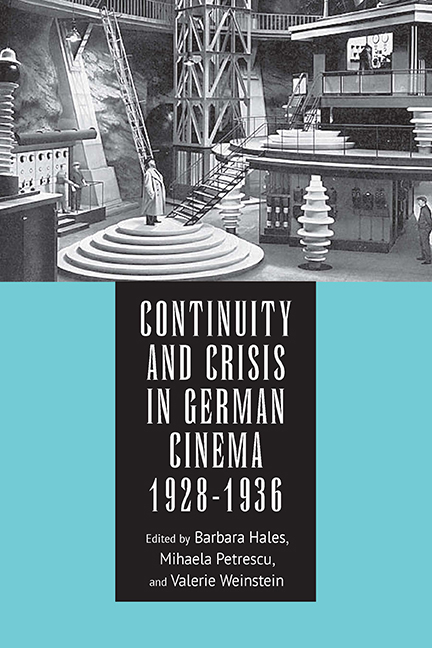Book contents
- Frontmatter
- Contents
- List of Illustrations
- Acknowledgments
- Introduction
- Part I Politics
- Part II The Economy
- Part III Concepts of Race and Ethnicity
- Part IV Genre Cinema
- Part V Making Cinema Stars
- Part VI Film Technologies
- Part VII German-International Film Relations
- Selected Bibliography
- Notes on the Contributors
- Index
7 - The Zigeunerdrama Reloaded: Leni Riefenstahl’s Fantasy Gypsies and Sacrificial Others
Published online by Cambridge University Press: 08 May 2021
- Frontmatter
- Contents
- List of Illustrations
- Acknowledgments
- Introduction
- Part I Politics
- Part II The Economy
- Part III Concepts of Race and Ethnicity
- Part IV Genre Cinema
- Part V Making Cinema Stars
- Part VI Film Technologies
- Part VII German-International Film Relations
- Selected Bibliography
- Notes on the Contributors
- Index
Summary
When the lights went out, I sat incognito in a corner seat in order to view “Tiefland” as an ordinary film-goer for the first time—free of all the problems I had endured since the making of my film. As the first few takes flashed across the screen, I was assailed by memories of all the pain associated with the making of this picture. Were the sacrifices worth it?
—Leni RiefenstahlLENI RIEFENSTAHL's TWO BEST-KNOWN FILMS, Triumph des Willens (Triumph of the Will, 1935) and Olympia (1938), and even her directorial debut, Das blaue Licht (The Blue Light, 1932), have been analyzed and argued over by critics and supporters alike. Quite understandably, the tendency has been to quibble over the same questions: How does her work relate to the ideology of the Nazi regime and what does it tell us, if anything, about her complicity? Does her early work prefigure—and her later work echo or contradict—the propaganda films she produced so successfully? The responses have been wide-ranging. Her supporters emphasize that she was a groundbreaking director and accept her insistence that she was only an artist, never a committed Nazi. Her detractors point to her resume as more than sufficient evidence of her culpability and insist that, artistic achievement aside, she served Hitler's regime far too enthusiastically to be excused. And critics such as Robert Sklar have questioned the tendency to accept unhesitatingly the notion of her directorial excellence, suggesting that we should “give her the credit [and blame] that she deserves… . Her films are mixtures of the remarkable … and the commonplace.”
Considering the controversy that Riefenstahl elicits, it is surprising that her second and final nondocumentary film, Tiefland (Lowlands, 1954), for which, as she stated in her memoirs, she made so many “sacrifices,” has not been examined more carefully. This analysis attempts to expand on the understanding of Riefenstahl's work by focusing on a narrow question, considering the way in which it points not only forward, but also back, and builds on and redefines existing filmic traditions and genres in her own work, in particular in the dramatic films.
- Type
- Chapter
- Information
- Continuity and Crisis in German Cinema, 1928-1936 , pp. 151 - 166Publisher: Boydell & BrewerPrint publication year: 2016



